Tomorrow, a presidential spotlight will shine on Florida's Catholic school renaissance.
President Donald Trump is set to visit St. Andrew Catholic School, a budding success story in Orlando's Pine Hills neighborhood.
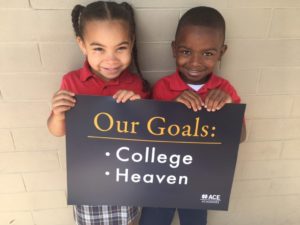
Students at St. Andrew Catholic School learn as early as kindergarten to prepare for college - and heaven.
It's one of four Greater Orlando Catholic schools that have joined the Notre Dame ACE academies, a national network that aims to revitalize urban Catholic education and lift academic outcomes.
Bucking trends elsewhere in the country, Florida’s Catholic schools are growing, slowly but steadily. National organizations have noticed. There are now seven ACE Academies in Florida, with more on the way. Other Catholic school networks, like Cristo Rey high schools, are expanding in the state.
Thanks to the nation's largest private school choice program, they're able to serve growing numbers of low-income and working class students.
Statewide, more than 98,000 students use Florida tax credit scholarships. The typical parent who uses a scholarship is a single mother earning less than $25,000 a year. Annual program evaluations show students who use the program tend to be among the most disadvantaged children in the state, and tend to struggle academically in public schools. After receiving scholarships, they make academic gains that match their national peers from all income levels. (more…)
As Kayla Yaks advanced at St. Luke Catholic School in Palm Springs, Fla., she developed a passion for art and a plan for what she wanted to do after eighth grade.
She's hoping for a coveted slot at Dreyfoos School of the Arts, one of the most sought-after magnet programs in the Palm Beach County school district.
But Kayla said this year, she noticed some changes at her school - changes that got her thinking beyond high school.
This fall, St. Luke officially became a Notre Dame ACE Academy, part of a national effort to revitalize Catholic schooling.
There were signs of change students could see. Posters hung around the PreK-8 campus encouraged them to think about a pair of long-range goals: college and heaven. Teachers attended a summer workshop in South Bend, which helped instill a belief that each of their students is capable of reaching both.
There may have been bigger changes happening behind the scenes, but just a few months into the school year, the culture shift had made an impression.
"It showed me that I should have more than one goal, and I can go forward and do something higher than what I just accomplished," Kayla said.
The emphasis on goal-setting and college attendance would seem familiar to anyone who's visited a charter school run by an organization like KIPP. But the similarities don't end there. (more…)
A new report looks at a key aspect of the Catholic school renaissance we've explored before on this blog: The rise of private school management organizations — which, it turns out, are not confined to Catholic schools.
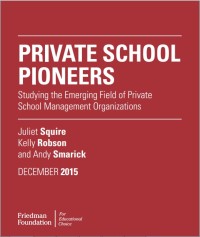 The report, from the Friedman Foundation for Educational Choice, looks at the rise of these private school networks, which borrow some features from their cousins in the charter school world.
The report, from the Friedman Foundation for Educational Choice, looks at the rise of these private school networks, which borrow some features from their cousins in the charter school world.
Charter management organizations like KIPP and education management organizations like Charter Schools USA now run a third of America's charter schools, providing financial backing, back-office support and other advantages to schools in their networks.
According to the report, new organizations are starting to do similar things for private schools.
These budding private school management organizations (PSMOs) are independent entities that operate or help operate three or more private schools. They are a potentially important innovation in the supply of private schools.
The authors — Kelly Robson, Juliet Squire and Andy Smarick of Bellwether Education Partners — tracked down 14 organizations that meet their definition, which means they exist outside the government or existing church structures. Eight of the organizations have some kind of church affiliation. Most of those, including the two that are active in Florida, are Catholic. There's also a network of Lutheran schools. (more…)
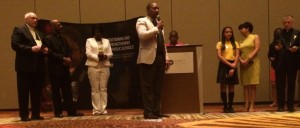
Flanked by Central Florida students and educators, Notre Dame ACE Academies director Rodney Pierre-Antoine announces plans to work with the Diocese of Orlando.
An effort to spur a renaissance in urban Catholic education is set to expand its presence in Florida, joining forces with four schools in the Diocese of Orlando and nearly doubling its number of participating schools.
The Notre Dame ACE Academies are developing a new model of Catholic schools that work with the university to strengthen their instruction and management.
The goal is to develop schools with impressive academic results that can attract new students — including those whose families might have thought a Catholic education was beyond their means — and push them toward the twin goals of "college" and "heaven."
At a conference of Catholic educators this week in Orlando, Rodney Pierre-Antoine, the director of the ACE Academies, announced plans to add four Central Florida schools to its network:
The ACE (short for Alliance for Catholic Education) Academies began five years ago, and currently include five schools — three in Tuscon, Ariz. and two in the Tampa Bay region.
The goal is to create "proof points of excellence" that can be replicated around the country, Pierre-Antoine said. The academies chose the Orlando area in part because they had buy-in from Bishop John Noonan and other local church leaders.
Since ACE Academies are open to low-income students and emphasize closing achievement gaps, it also helped that Florida is home to one of the country's largest private school choice programs. The tax credit scholarship program currently serves nearly 70,000 children, and is administered by Step Up For Students, which co-hosts this blog and employs the author of this post.
Tampa, Fla. may soon become a hub for a new breed of Catholic schools that target disadvantaged students and help them get to college.
The latest sign: The Cristo Rey Network planning to open one of its high schools in the city. The new school is set to open in 2016.
The Chicago-based network operates 28 college-preparatory Catholic schools around the country. Its model for urban faith-based education has been praised for its success with low-income and minority students.
Cristo Rey schools are aimed at students from families earning less than $44,000 year, and proclaim that all of their recent graduates have been accepted to college. Students participate in work-study programs that help cover their tuition costs. They spend one day a week working in professional settings like banks, hospitals and law firms.
While they operate with the blessing of local church leaders, the Cristo Rey's governance and operations are separate from parishes and dioceses that traditionally run Catholic schools. The network's unique organizational structure has gotten the attention of some school choice advocates, who have approvingly likened it to high-impact charter school organizations.
The Cristo Rey Tampa High School is set join another relatively new family of urban Catholic schools that recently set up shop in the region: The Notre Dame ACE Academies.
Both Tampa Bay-area ACE schools serve students up to eighth grade. Like the Cristo Rey schools, they stress college attendance and offer a Catholic education to low-income students from a variety of religious backgrounds (more than 40 percent of Cristo Rey students are non-Catholic).
These schools target states like Florida, Louisiana and Arizona that offer private school tuition scholarships to low-income students. The Florida tax credit scholarship program is one such program. It is administered by Step Up For Students, which co-hosts this blog.
It’s the benchmark for long-term academic success - having every student reading at grade level or higher by the end of third grade. And it’s the lofty mission of a new reading program for Catholic school students developed by the University of Notre Dame’s Alliance for Catholic Education Academies.
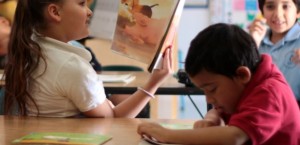
ACE Readers is an innovative program for Catholic elementary school children in Arizona and Florida.
ACE Readers is working with five Catholic schools in Arizona and Florida to beef up reading programs by purchasing hundreds of books for classrooms, sponsoring summer camps and giving teachers learning strategies that help target instruction. There also is a learning specialist assigned to each region to assist teachers and principals with training, and with implementation of tests and lesson plans.
The undertaking is funded by the big-box chain Target and orchestrated by ACE, an outreach program that trains future Catholic school teachers and administrators to strengthen the schools and the communities they serve. ACE Readers is an extension of that effort, with an eye on eliminating the achievement gaps that plague at-risk students.
“Literacy skills and reading ability are at the core of what kids need to know to do well at school,’’ said Christian Dallavis, senior director of leadership programs at ACE. “Our focus is on reading because we believe that without it, students don’t have the tools they need to succeed in high school, college and beyond. We want them to learn to read so they can read to learn.’’
Accomplishing that feat also helps with other goals – reviving Catholic schools and giving parents more high-quality options, Dallavis said.
“Having strong fundamentals like reading, math and other instruction has driven our enrollment up and provided more revenue to restore P.E., music and art – classes that had to be cut when the budget was to the bone,’’ he said. “It’s allowed us to be able to offer students and parents more.’’ (more…)
Across America, Catholic schools are closing. But in San Antonio, Fla., where cows meet cul-de-sacs on the fringe of greater Tampa, St. Anthony Catholic School is getting new classrooms.
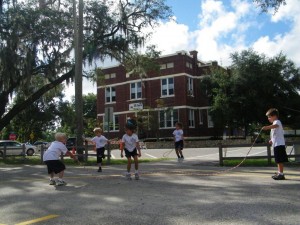
Just a few years ago, there was serious talk of closing St. Anthony Catholic School in San Antonio, Fla. But after recent enrollment gains, the school is planning to replace aging portables with a new building. (Photo courtesy of St. Anthony)
The 129-year-old, K-8 school has rebounded since it hit a Great Recession low of 153 students in 2010. It’s up to 196 students this year and aiming for 270 within a few. The comeback has quashed talk of closing, said the principal, Sister Alice Ottapurackal, and instead prompted the diocese to schedule a new building to replace aging portables.
“All this is going to be gone,” said Sister Alice, gesturing to a clutch of boxy buildings behind the stately red brick of the main school house. “It’s an amazing feeling,” she said of the rising numbers. “It’s good to see people are still interested in Catholic education.”
St. Anthony represents a fresh, Florida twist to the oft-told story of Catholic school decline. Choice and competition are part of the Sunshine State’s potentially more optimistic plot line.
Catholic school enrollment nationwide fell another 1.5 percent this year to 2,001,740, according to a report released March 22 by the National Catholic Educational Association. But in Florida, enrollment ticked up for the first time in five years – by 1 percent in K-12 and 2.7 percent counting pre-school, according to the Florida Catholic Conference.
Florida’s 217 elementary and secondary Catholic schools now enroll 82,489 students, up from 81,632 last year. The jump is even more impressive given competition from Florida’s booming charter schools, which added 48,000 students in the past two years alone.
The most visible reason for growth: Florida’s tax credit scholarship program for low-income students. The number of scholarship students in Catholic schools rose this year from 6,538 to 8,575, a 31 percent increase, according to data from Step Up For Students, which administers the program and co-hosts this blog. In some urban counties, the trend lines are even steeper. Over the last three years, the numbers in Hillsborough, which includes Tampa, leapfrogged from 167 to 431, with annual increases of 41 percent, 25 percent and 47 percent, respectively. (more…)
 News about Catholic schools in the U.S. usually isn't good. Rarely a week goes by without a headline about another one closing and, with it, a neighborhood institution that for generations brought high-quality education to often low-income families. So what a nice change to see another local story about a Catholic school in Tampa, for years on the brink of closing, making a comeback.
News about Catholic schools in the U.S. usually isn't good. Rarely a week goes by without a headline about another one closing and, with it, a neighborhood institution that for generations brought high-quality education to often low-income families. So what a nice change to see another local story about a Catholic school in Tampa, for years on the brink of closing, making a comeback.
Thanks to hard work and grit and a growth in tax-credit scholarships. St. Peter Claver recruited 163 students this year, up from 102 las year, according to today's Bay News 9 (which also took this photo). Ninety percent received tax credit scholarships, which are only available to families who qualify for free- or reduced-price lunch.
Increasingly, St. Peter Claver isn't an anomaly. The Wall Street Journal reported in June that, "Fo the first time in decades, Catholic education is showing signs of life." It continued: "Driven by expanding voucher programs, outreach to Hispanic Catholics and donations by business leaders, Catholic schools in several major cities are swinging back from closures and declining enrollment."
On a related note, another Tampa Bay area Catholic school, Sacred Heart in Pinellas Park, is holding a celebration this weekend to highlight its new partnership with the Notre Dame ACE Academies. As we've written before, the Notre Dame group is moving to take Catholic schools to a higher level, and it is using a couple of Tampa Bay schools as a model. Tax credit scholarships are key to its efforts to boost enrollment, particularly among Hispanics.
On an education landscape with more private options, these are signs of healthy ferment.
 Charter schools took a page from Catholic schools when they arrived in the 1990s and began their expansion – character development, solid discipline, a no-excuses approach to success for low-income kids. But now it's Catholic schools, struggling with declining enrollment (in part because of competition from charters), that should borrow good ideas from charters, the author of a new report says.
Charter schools took a page from Catholic schools when they arrived in the 1990s and began their expansion – character development, solid discipline, a no-excuses approach to success for low-income kids. But now it's Catholic schools, struggling with declining enrollment (in part because of competition from charters), that should borrow good ideas from charters, the author of a new report says.
Sean Kennedy, a visiting fellow at the Lexington Institute, points to how high-performing charter schools have embraced data and technology to better differentiate teaching, including use of “blended learning” models that have both improved student performance and reduced cost. “They’ve really invested in data,” Kennedy, a product of Catholic schools, said in the redefinED podcast below. “And that’s something that, unfortunately, for various cultural and just simply resource reasons, Catholic schools have shied away from.”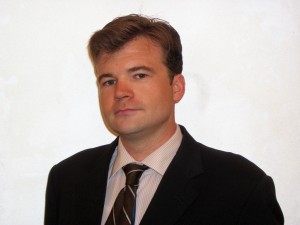
Kennedy says despite the funk they’re in, Catholic schools can more nimbly embrace promising trends than other education sectors and again stand out. They don’t have the bureaucratic or union entanglements of traditional public schools, and they still have the faith and character-building components in their favor.
“I’m very optimistic,” Kennedy said. Catholic school educators “often take huge pay cuts from what they would get in public schools. They often work much longer hours. And they love what they do. So if it can be presented to them in a way that this is going to benefit both their teaching and their students directly, I think teachers and administrators in Catholic education are at a special advantage to grab a hold of this data movement and really run with it.”
Kennedy also said vouchers and tax credit scholarships can be crucial in Catholic school reform efforts, particularly with Hispanic students. A project is now underway in the Tampa Bay area with two Catholic schools that accept tax credit scholarships and the Notre Dame ACE Academies, which aims to revitalize Catholic education. “There’s fewer and fewer kids in inner city areas being served by high quality Catholic schools, as these Catholic school business models kind of collapse in on themselves. And that’s a tragedy,” Kennedy said. “With the growing Hispanic population, there’s even greater need to serve these families.”
After reading story after story about Catholic schools closing, it was heartening this morning to instead read about an aggressive local effort to help them rebound. The Diocese of St. Petersburg, in the Tampa Bay region of Florida, has launched an ambitious plan to reverse declining enrollment and ensure that Catholic schools remain a solid part of the community bedrock that they have been for generations.
As detailed in today’s Tampa Bay Times, the effort aims to make school operations more efficient and academic offerings more rigorous. It includes a key partnership with Notre Dame University’s Ace Academies, which will help with the quality piece. And it involves increased use of Florida’s tax credit scholarship program, which gives low-income families more learning options for their kids. “It’s a reimagining of how our schools would look like in five to 10 years from now, to make them viable,” Alberto Vazquez-Matos, the diocese’s superintendent, told the Times.
In this podcast interview with redefinED in March, Christian Dallavis, director of the ACE Academies, put the Tampa Bay partnership in context. He noted Hispanics in the U.S. make up two thirds of practicing Catholics under the age of 35, and that the high school graduation rate for Hispanics is about 50 percent. “We see the future of the church is on pace to be kind of radically undereducated,” he said. But “we also have a solution in that we know Catholic schools often put kids on a path to college in ways that they don’t have other opportunities to do so.”
The success of Hispanic students is especially important in Florida, where Hispanics could be a majority in a few decades. Boosting Catholic schools with innovative partnerships and school choice programs is a bold response that offers hope for the future.